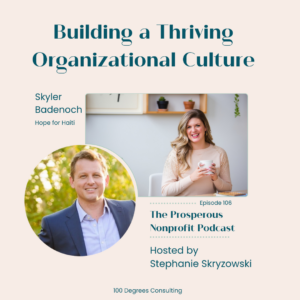
In the heart of Haiti, Hope for Haiti, a nonprofit organization, has been changing the lives of Haitians for over three decades. It all started with a mission to build a brighter future for the Haitian people, but the organization’s CEO, Skyler Badenoch, quickly realized that it couldn’t be done alone. He understood that people are essential in driving sustainable and scalable impact, and he knew that to make a lasting impact, he needed to build a strong and sustainable organizational culture.
Key Pieces to a Strong Organizational Culture
Hope for Haiti’s culture is built on autonomy, clear growth trajectories, fair compensation, personal and professional growth, collaboration, accountability, and humor. These key pieces work together to create a culture that nurtures people, encourages growth and personal development, and values autonomy, accountability, and collaboration.
Autonomy: Empowering Employees to Innovate
The foundation of Hope for Haiti’s culture is autonomy. It was founded on the belief that people work best when they have a sense of ownership over their work. Badenoch believes in empowering his team to make their own decisions and use their creativity to solve problems. This approach not only helps employees feel more invested in their work but also leads to more innovative solutions.
Growth and Development: Investing in Employee Growth
The organization places a significant emphasis on personal and professional growth. They understand that investing in their employees’ growth is an investment in the organization’s future. The organization provides opportunities for its employees to develop new skills and advance in their careers. This helps create a sense of purpose and a feeling of being part of a team that is making a difference.
Compensation: Fair and Competitive Pay
Hope for Haiti understands that fair compensation is essential in creating a sustainable organizational culture. Badenoch is passionate about paying employees fairly and competitively for their work. This helps attract and retain talented employees and shows that the organization values and respects their contributions.
Collaborative Leadership: Everyone Has a Voice
Collaborative leadership is another value that Hope for Haiti’s culture emphasizes. Badenoch believes that everyone on the team should have a voice and contribute to decision-making. This approach fosters a sense of community and helps ensure that the organization is making the best decisions for its mission.
Embracing Mistakes: Learning from Failure
Hope for Haiti’s culture is also one of embracing mistakes. Badenoch understands that mistakes are inevitable when trying new things, and he encourages his team to take risks and learn from their mistakes. This approach helps create a culture of innovation and continuous improvement.
Transparency in Nonprofit Work
Hope for Haiti believes that transparency is a crucial component of nonprofit work. They proactively share their audit financial statements and 990 with their donors. This practice is a powerful way to build trust with donors who want to dig deeper into the organization’s finances. Sharing audit financial statements is not common practice among most nonprofits. But it is a way to set an organization apart.
The Importance of Cash Forecasting for Nonprofits
Having a cash reserve is critical for the financial stability of nonprofits. However, many organizations struggle with cash flow and are unable to keep a reserve. This struggle can create stress and limit an organization’s ability to plan and implement programs effectively. Hope for Haiti’s capital campaign to build a new healthcare campus is an ambitious project that will serve as a model for sustainable healthcare in the region. The organization’s commitment to green technology and collaboration with other organizations is a testament to their dedication to creating a brighter future for the Haitian people.
Hope for Haiti’s strong and sustainable organizational culture is a testament to the power of autonomy, growth and development, fair compensation, collaborative leadership, embracing mistakes, transparency, and cash forecasting. By taking inspiration from Hope for Haiti and focusing on these key pieces, nonprofit leaders can create thriving organizations that can have a significant impact on communities. Let us strive to create cultures that nurture and empower our people, foster innovation and growth, and ultimately make a positive impact on the world.
Read the podcast transcripts here.
Links mentioned in this episode:
- Connect with Stephanie on Instagram
- Connect with Skyler on Instagram
- Connect with Hope for Haiti on Instagram
- Understand (and maximize) your organization’s numbers with this free download.
Want more of the podcast?
- New episodes are released weekly! Find them all plus show notes and exclusive bonus content at 100degreesconsulting.com/podcast
- Leave us a review! Click here, scroll to the bottom, tap to rate with five stars, and select “Write a Review.” Let me know what you loved most about this episode!
- Subscribe to the show so you don’t miss a thing



















